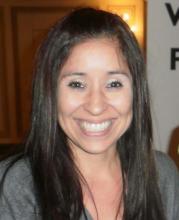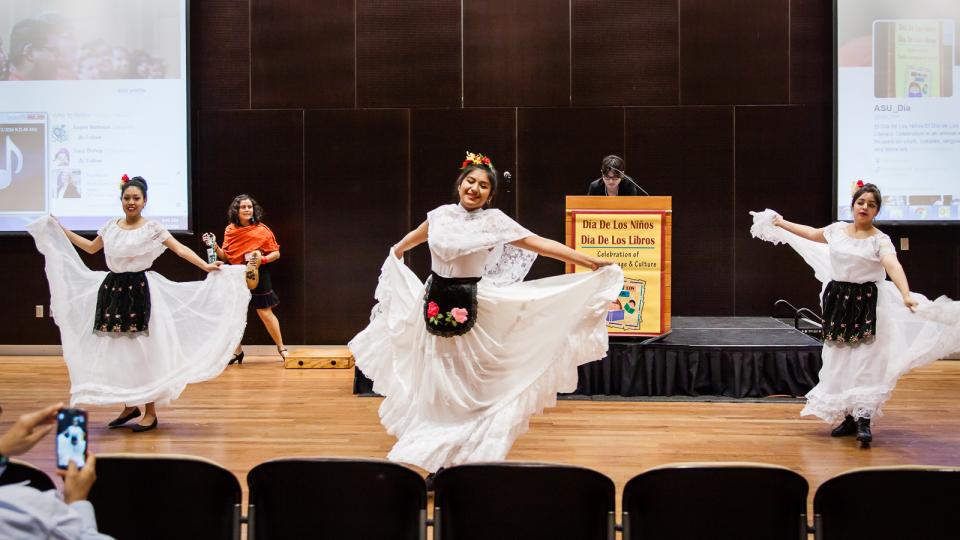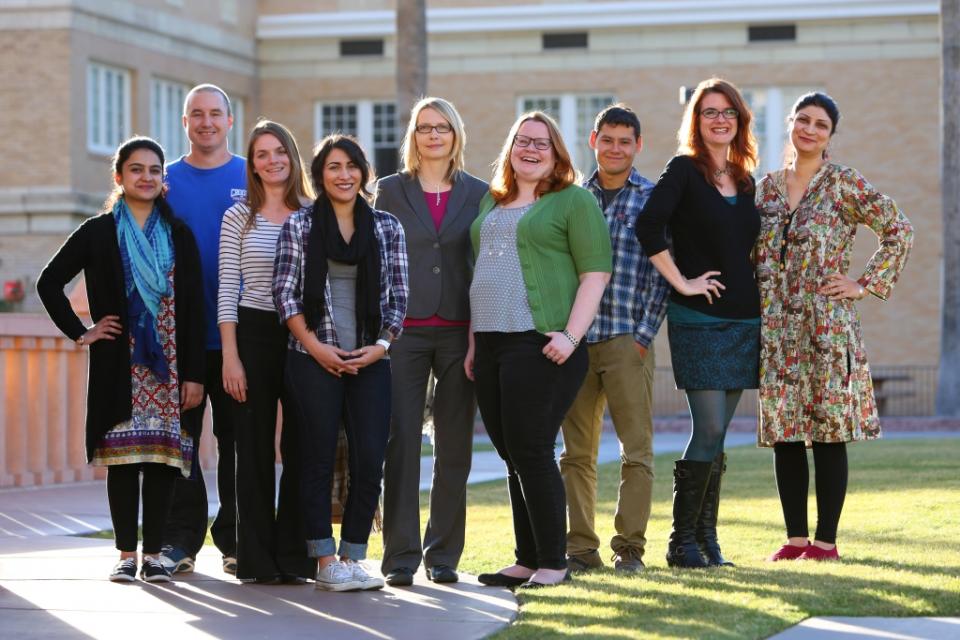To Create Community, Foster Narratives of Belonging
We have all known the long loneliness, and we have found that the answer is community.
—Dorothy Day
What does it mean to belong?
According to social psychology experts Gregory Walton and Geoffrey Cohen, “the need for social belonging—for seeing oneself as socially connected—is a basic human motivation.” Social connections can be based on many things: ethnic identity, geography, family, or common interests, for example.
Without those connections, we suffer. Many argue that some of society’s greatest ills—addiction, suicide, mass murder—arise from a sense of alienation.
Is feeling connected to others so powerful a buffer against life’s challenges? If so, could we reduce substance abuse, self-harm, and violence simply by reaching out? By building community?
With precisely that belief, two doctoral students in the Department of English are exploring concepts of belonging and community in their academic work.
Tracey Flores is in the English Education PhD program. A former English Language Development (ELD) school teacher, she is deeply passionate about her work encouraging Latina writers. In 2011, with guidance from Professor Jim Blasingame, Flores launched ASU’s annual El Día de los Niños, El Día de los Libros literacy celebration for kids, which won the 2013 Estela and Raul Mora Award. She has been a research assistant for ASU’s U.S. Department of English-funded Teaching English Learners Academic Content (TELAC) program and co-director of the Central Arizona Writing Project (CAWP), an ASU site of the National Writing Project.
For her efforts she has been awarded several prestigious fellowships and awards: a Cultivating New Voices among Scholars of Color Fellowship and CEE Graduate Student Research Award, both from the National Council of Teachers of English, and most recently a Dissertation Completion Fellowship from the ASU Graduate College.
Crystine Miller is completing her PhD in English Literature. Her work centers on Asian American and Latina/o conceptions of citizenship for which she was awarded a Graduate Education Dissertation Fellowship from the ASU Graduate College and the Wells Fargo Transborder Chicana/o and Latina/o Studies Research Scholarship from the ASU School of Transborder Studies. From 2014-2016, she was a research associate for the ASU-Kinnaird Project “Globalizing Research and Teaching of American Literature,” which is funded by the U.S. Department of State.
Many of Miller's efforts have been centered on building community within ASU and the Department of English specifically, having been active in the ASU Graduate Women Association (GWA), and helping organize English's Americanist Reading Group. Miller already has a publication under her belt as well; her paper “Héctor Tobar’s The Tattooed Soldier and the Latino/a trauma narrative” appeared in the highly regarded journal, Latino Studies in Fall 2016.
We sat down with Flores and Miller to find out more about their projects and goals.
Please describe your dissertation project.
Tracey Flores: My dissertation is rooted in experiences as a second-generation Chicana, my upbringing, and my classroom teaching with and for culturally, linguistically diverse students and their families. It is very much a part of my life journey from childhood to an adult—and teacher, PhD student, and aspiring scholar.
My project focuses on the stories and knowledge shared between Latina adolescent girls (grades 9-10) and their mothers and fathers through their participation in Somos Escritores/We are Writers, bilingual writing workshop. Somos Escritores is a writing workshop for Latina girls and their mothers that aims at creating a welcoming space for mothers and daughters to engage in and share knowledge and stories from their lived experiences through the use of oral storytelling, writing, and art. I’m interested in the stories shared by daughters, mothers, and fathers and what we can learn about who they are, what matters to them, and what they envision for their futures. My hope is that this project will honor the voices and experiences of Latina girls and their parents and provide important insight into how we, as educators and scholars, can create more inclusive spaces in our schools that are welcoming and build off the knowledge and experiences—the rich experiences—that reside in our families.
Crystine Miller: My dissertation looks to contemporary narratives of immigration—fiction, film, media, and performance—as they imagine how individuals understand themselves as belonging or being excluded from particular communities. Since I focus on immigrant narratives as sites where people are often moving between and among national spaces, my project mostly focuses on citizenship as a legal, social, political, and cultural form of belonging or exclusion. I’m interested in the presence of the body—its labor, its feelings, its confinement—as it intersects with social structures like race and gender and political structures like national origin to think about how definitions of the citizen are so much more complicated than a simple legal term.
How did you come to this project? What was your intellectual/academic path?
TF: This project is truly a lifelong journey. Each experience of my life, as a child, a young Chicana, teacher and student, all of my experiences and identities intersect in the inception of the project, my desire to illuminate the narratives and experiences of Latina girls and their families—those that are many times silenced or left out of “dominant narratives” and my belief in the power of writing and families. This project also stems from previous projects that I facilitated with and for my students in schools across Glendale and Phoenix in collaboration with Dr. Jessica Early, CAWP Director, who supported my vision, early on as a classroom teacher, of families writing and sharing stories.
CM: My intellectual path has been guided by my mentors, especially the chair of my dissertation committee, Dr. Claudia Sadowski-Smith, and fostered by many others along the way. Before entering graduate school, I worked in local politics doing social justice work mostly involving advocacy and policy reform for the working poor. So, when I entered a graduate literature program, I was really invested not just in culture as an aesthetic object, but culture as a powerful political space. As I began to think more about what I wanted to research, I became drawn to literature from marginalized communities because they offered interesting and provocative insights into these intersections of culture and politics. The other, more personal side of my journey is that as I became more and more interested in immigrant literatures and started thinking more about border spaces, I realized that I grew up in a border state (Montana), but one that isn’t often thought of as such. So, my intellectual path and my personal background brought together all these different interests.
Is there a place in your work where the personal crosses the academic? How does your research or do your findings thus far mirror or depart from your own experience?
TF: My work definitely crosses the personal and academic. My dissertation is true testament to my belief in the power of writing to transform lives, the deep knowledge and wisdom that resides in our youth and their families, and the strength and courage of families to improve their lives and the lives of their children.
I believe that my research is personal and political—and that the questions that I seek to answer and the heart of my work is rooted in a deep desire to make a difference in the world. I don’t and can’t separate my experiences from what drives me to do this work. My goal is to always honor those that open up their lives to me and to be a learner alongside them. They are the true experts and in working with youth and families it is my duty to tell their story in a way that does justice to their experiences and to our collective experience in our research together.
My journey from teacher to PhD candidate to aspiring scholar is a community effort.
—Tracey Flores
In my current work, Somos Escritores, the Latina girls are incredible advocates for change. They have a deep desire to make a difference in the world and they live critically conscious lives—aware of the injustices that are part of their personal lives—in their schools, communities, and the world. They seek to make a mark in the world by being agents of change. They speak to desire, all of them, to define themselves on their own terms and “not become a stereotype.”
Their mothers and fathers are supportive and encouraging of their daughters’ hopes and dreams. They work hard so that their daughters can achieve success both personally and academically. They are not only raising their girls to be strong, but they are also raising them to follow their passions and live a happy life. Alongside daughters, each parent involved in the workshop navigates the known and unknown, in resourceful ways, all in the name of love and hope that their girls will thrive in the world.
This mirrors what I lived in my own life experiences and witnessed as a classroom teacher.
CM: Though this project is traditionally academic, the central questions that drive my work are deeply personal. Coming from the western United States, my academic work has been informed by the politics of place that defined much of my upbringing. Living in the rural West, I grew up around this mythology of wilderness and rugged individualism that became increasingly challenging to square with the actual politics of the western United States and the diverse groups of people who live, work, and have families here. I also grew up in a largely agricultural working-class community where education meant more learning how to drive a tractor rather than reading books and learning from people with advanced degrees. So, even though my personal interest lies in questions of who people are, where they are from, how they are understood to belong or not belong, my academic pursuit of this question has made me feel somewhat displaced from the place that fostered this question in the first instance.
Living in both worlds and the challenges that arise from that are deeply personal experiences that also drive my continuing interest in questions of belonging and community.
Tracey: you have been the driving force behind ASU’s El Día celebration. Crystine: you have been involved with several aspects of community including working as Research Associate on the State Department grant. How have these “extra-curricular” activities influenced or driven your curricular work?
TF: All of my service and scholarship—as a teacher and PhD Student—is intertwined into the things that are the most important to me…our youth and their families. I started my collaboration on Día with Dr. Blasingame while still a classroom teacher. This collaboration has led to the creation of a beautiful celebration of youth, cultures, languages, and literacies. It is a celebration that brings the community together in the service of our youth and creating space to celebrate them and help them to realize the power of their voices and experiences to make a difference in the world.
CM: I’ve done some work as part of a State Department-funded grant, which is administered through ASU’s Center for the Study of Religion and Conflict, that partners ASU’s English Department with the English Department at Kinnaird College for Women in Lahore, Pakistan. The project focuses on studying American literature in a transnational context, which of course informs my research on immigrant narratives. The whole project is to re-think American literature and the American literary canon through a transnational lens, and to think about the value of teaching and researching American literature outside of a U.S. national context. But, the most formative part of this experience has been working with the exchange faculty who have studied at ASU over the last three years. Working alongside these women—who are themselves scholars, teachers, mothers, and writers—has been has been an intellectually and personally transformative experience.
You both have also become mothers in the last year. Can you describe the impact of this major life occurrence on your view of academia? Has your research changed? What kind of family or community support have you had?
TF: I would say that more than ever, not only with the birth of my daughter, Milagros, but also with the election results, that I feel a deep sense of urgency in my work. As a future scholar, I realize the importance of sharing my work widely—in both traditional and non-traditional ways—in order to move conversations forward and engage in coalition building with and for our youth and families. Our work, my work, my voice and the voices of the youth and families that I work with and for are powerful and have the power to make a difference. I see my work as advocacy work and a way to disrupt narratives that view Latina/o youth and their families as disengaged and in need of fixing and remediation.
My journey from teacher to PhD candidate to aspiring scholar is a community effort. The love of my family, the support and encouragement of my former students and their families (who are my drive and motivation to keep fighting), my Latinx/Black Caucus familia, CNV cohort and professors and peers have lifted me up on this journey. And, I need to mention my committee, my wonderful committee: Dr. Blasingame, Dr. [Elisabeth] Gee, Dr. Early, and Dr. [Sujey] Vega. I am blessed to have such a supportive community that believes in me and my work—and is giving of encouragement, support, and love. This degree will be so much more than me. I carry them all with me—every step of the way.
CM: This is a great question! In many ways, it would be impossible for the birth of a child not to change my view and experience of academia. Especially in those early days, weeks, and months, babies can be all-consuming, a situation that does not always lend itself to the intensity of a PhD program and scholarly academic life more generally. Thankfully, my committee and my mentors have been very supportive of my research, even as it has been impacted by my personal life. And despite the challenges of having children in academia—especially for women as has been well-documented—for me, there has been a richness to living in these two worlds simultaneously that has been productive in making me think about the ways that we belong and do not belong in various communities. In this way, having a baby during the dissertation process has certainly changed my research for the better.
Themes in my dissertation cohere around how closely narratives of immigration and citizenship are formed around ideas of the family.
—Crystine Miller
When I started writing my dissertation, the project was structured more around these broad concepts like labor and incarceration. However, partly due to the natural evolution of a project like this and partly due to my own attentiveness to issues of motherhood and children, these themes in my dissertation have cohered more concretely around how closely narratives of immigration and citizenship are formed around ideas of the family. For example, one of my chapters looks at motherhood as a national fantasy around which immigration is often structured while another chapter looks at how the figure of the detained child migrant becomes a potent symbol for how the nation imagines itself in relation to migrants as potential future citizens. While these ideas were always in my project, having a child made me think more critically about the issues I was already interested in.
Photo 1 courtesy Tracey Flores
Photo 2: Crystine Miller by Bruce Racine
Photo 3: Folklorico dancers perform at the 2016 El Día de los Niños, El Día de los Libros celebration. Photo by Bruce Matsunaga
Photo 4: Members of the spring 2016 Kinnaird College cohort pose with their ASU hosts. From left to right: Zahra Hanif, Lance Graham, Crystine Miller, Mercedes Palomo, Claudia Sadowski-Smith (the grant's principal investigator), Amilynne Johnston, Azamat Mamadaliev, Ashley Barnard, and Saifiya Fawad. Photo by Bruce Racine




